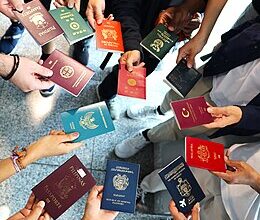The Impact of Online Misinformation on Gender-Based Narratives in Nigeria

BY: Olasupo Abideen
In Nigeria, as in many parts of the world, the digital age has brought about remarkable access to information, and with it, a proliferation of misinformation. This wave of false or misleading information, particularly on social media platforms, has taken root in various aspects of society, including gender relations. The unchecked spread of misinformation is not just an issue of general concern, but one that disproportionately affects women and gender-based narratives in Nigeria.
Misinformation on gender-related issues often thrives in a society with deeply entrenched cultural norms and gender stereotypes. Nigeria, a country where traditional roles often dictate societal expectations of men and women, has seen an uptick in online narratives that reinforce these views. These narratives perpetuate harmful stereotypes, misinform the public, and shape perceptions in ways that undermine gender equality.
One clear example is how online misinformation perpetuates harmful myths about women’s roles in society. In Nigeria, many viral posts and stories continue to portray women as inferior to men, often questioning their capability to hold leadership positions or succeed in careers dominated by men. Such misinformation often frames women who challenge these stereotypes as anomalies or, worse, as individuals who are “disrespecting tradition.” This has the dual effect of reinforcing gender stereotypes and discouraging women from pursuing leadership roles or challenging gender norms.
The recent surge in misinformation about gender-based violence is another critical issue. False reports on social media often muddy the waters around the realities of domestic abuse, rape, and other forms of violence against women. For instance, stories of women “faking” rape allegations or the spread of misinformation about what constitutes consent have not only distorted public perception but have also made it harder for victims of gender-based violence to seek justice. Such narratives feed into the victim-blaming culture prevalent in parts of Nigeria, making it even more challenging for survivors to come forward.
Moreover, during major public events such as elections, gender-based misinformation is often weaponised to discredit female candidates or women in positions of influence with several female candidates getting targeted with malicious falsehoods online, including false claims about their personal lives or questioning their competence. Such attacks are frequently gendered in nature, aimed at undermining a woman’s public standing by targeting her character rather than her policies or competence. This not only limits women’s political participation but also reinforces the patriarchal narrative that leadership is a male prerogative.
In the health sector, misinformation about women’s reproductive health is rampant online. Myths surrounding contraception, fertility treatments, and even menstrual health circulate widely, particularly on platforms like WhatsApp, where forwarded messages often go unchecked. For example, widely circulated misinformation about the side effects of birth control has resulted in a decline in its usage among women in rural areas, contributing to unintended pregnancies and unsafe abortions. The lack of fact-based, accessible information on reproductive health perpetuates these dangerous myths, putting women’s health and lives at risk.
Addressing the problem of online misinformation requires a multi-faceted approach. Fact-checking platforms, such as FactCheckAfrica, play a crucial role in debunking falsehoods, but their reach is limited, especially in rural areas where internet access and digital literacy are low. There is a need for a more targeted effort to integrate fact-checking tools into widely used platforms, especially in local languages and with content tailored to Nigeria’s diverse communities.
Furthermore, civil society organisations and government agencies must collaborate to promote digital literacy programmes aimed at empowering individuals to critically evaluate the information they come across online. Encouraging women and girls to engage more actively in digital spaces, not just as consumers of content but as creators and fact-checkers, can help challenge the dominant gendered narratives and reduce the spread of harmful misinformation.
Lastly, social media companies operating in Nigeria must take greater responsibility for the content circulating on their platforms. Stronger content moderation policies that identify and remove gender-based misinformation, along with better reporting mechanisms for false content, are essential to creating safer online spaces for women.
The spread of online misinformation in Nigeria is not just a general societal issue but one that poses significant threat to gender equality. Addressing these challenges will require a concerted effort from fact-checking organisations, civil society, government agencies, and social media platforms to ensure that women are not disproportionately affected by the misinformation bedevilling Nigeria’s digital space.



